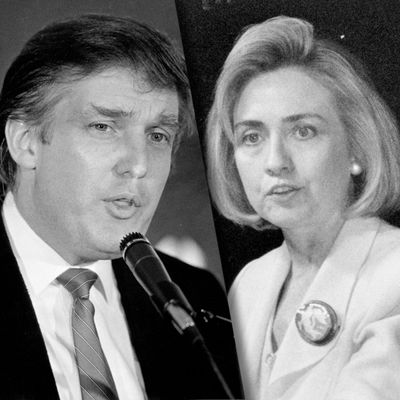
There’s a lot of shocking dot-connecting in Ava DuVernay’s essential new Netflix documentary 13th, a devastating portrait of America’s mass-incarceration epidemic. But perhaps most searing are the direct lines the director draws from Donald Trump, Bill Clinton, and Hillary Clinton to the United States’ current prison population of 2.3 million people. DuVernay has receipts, and she’s slapping them down on the table.
Both Trump and Hillary are featured prominently — and not very flatteringly — in the film, which opened the New York Film Festival and hit Netflix and theaters October 7. DuVernay started work on the movie two years ago, and only recently decided to rush it to screens in hopes of influencing the election conversation. Both Trump and Hillary appear not as candidates, but in the context of their past support for harsher criminal penalties. “They have been touching this issue in public life for a couple of decades now,” DuVernay said at a roundtable interview last weekend, “and we show them in that context, as opposed to getting into their ideological perspectives in this moment.”
13th takes its name from a loophole in the 13th Amendment, which abolished slavery “except for punishment for a crime.” The film tracks America’s history of locking up black and brown men, starting in the aftermath of the Civil War, when thousands of black people were arrested for petty crimes like loitering, through Richard Nixon’s emphasis on “law and order,” and into Ronald Reagan’s War on Drugs, which punished the use of crack, the drug of inner cities, more harshly than that of powder cocaine, the drug of white suburbs.
But the movie is equally harsh on Bill Clinton, whom DuVernay blames for nearly doubling the prison population with his 1994 Federal Crime Bill, which fast-tracked a generation of black men into prison. “I remember seeing Clinton play the saxophone on Arsenio, thinking, Oh, he’s so cool!, and falling for the ‘first black president’ thing,” DuVernay recalled at a recent Q&A, adding that everything she shows in the film is public information. “I didn’t go undercover. This is just widely available information that’s put in one place for folks for ease.”
Alongside footage of Bill being “tough on crime” is footage of Hillary Clinton as First Lady arguing that the bill was necessary to stop “super-predators” — an argument used to try children who’d committed violent crimes as adults. The Clintons have since reversed their positions, and 13th includes footage of Bill admitting to the NAACP that the bill “made the problem worse,” as well as Hillary’s speech at the DNC calling for criminal-justice reform. But DuVernay also makes sure to show an ugly moment in which Bill lashes out at a group of Black Lives Matter protesters. “I don’t know how you would describe the gang leaders who got 13-year-olds hopped up on crack and sent them out in the streets to murder other African-American children,” he says. “Maybe you thought they were good citizens, [Hillary] didn’t. You are defending the people who kill the lives you say matter.”
Trump’s history on the issue gets full treatment, too. There’s the full-page ad he took out in the New York Times in 1989, calling for the death penalty for the Central Park Five, a group of five young black and Hispanic men who were wrongfully accused of rape. Though the real-estate magnate wasn’t in a position to create policy at the time, DuVernay convincingly compares his rhetoric during the case to that of white segregationists in the Jim Crow South. And, unlike the Clintons, Trump has never reversed himself, nor apologized.
“I hope people’s eyes are opened to this really violent rhetoric,” DuVernay said. “We have a large majority of people who agree with [what Trump’s saying] and that’s not far from people smiling under men hanging from trees. Who are those people? … They might be your neighbor, because the candidate who endorses that kind of rhetoric is neck and neck with the candidate who doesn’t. That’s disturbing.”
Despite the film’s resonance in the current political climate, DuVernay says she has no plans to screen the film for either candidate. “I hope they both see it,” DuVernay said, before admitting that she didn’t know if that would make a difference. “It’s going to be us as a people demanding it that makes a difference for them. I think that’s all they’re responding to — what it’s going to take to win.”

